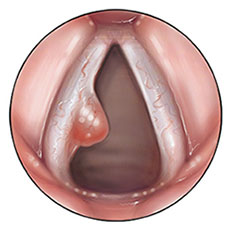Sylvia is a lawyer, and her long hours of speaking have led to vocal fatigue and hoarseness, sometimes accompanied by pitch problems or loss of voice. The inability to express herself forcefully affects her persuasiveness in court. Determined to seek help from an ENT specialist, she underwent an examination and was diagnosed with a nine-millimeter polyp on her vocal cords, which requires surgical removal and post-operative speech therapy. Her condition is now improving, and her work performance is significantly better.
Dr. LEE Shui Kwong, John, Specialist in Otorhinolaryngology, noted that vocal disorders are not uncommon in Hong Kong, with severe cases potentially leading to vocal cord polyps.
Vocal cord polyps are benign lesions that appear on the vocal cords, typically manifesting as unilateral soft masses that may be translucent, vascular, or denser tissue. Their impact is usually reflected in changes in voice quality and decreased comfort in speaking. This condition can cause considerable disruption to daily life, especially for professionals who rely on their voices. Vocal cord polyps differ from vocal cord nodules, which typically appear symmetrically on both sides.
(Source: Online picture)
Although vocal cord polyps do not pose a fatal risk, they may trigger a series of symptoms, with hoarseness being just one of them. Other symptoms include:

The formation of vocal cord polyps is usually associated with the following factors:

Diagnosing vocal cord polyps typically requires the following examinations:
Treatment for vocal cord polyps primarily falls into conservative and surgical approaches, depending on the impact of the condition on the patient's daily life.
Conservative Treatment |
Surgical Treatment |
|
• Reducing vocal cord use and avoiding shouting can help the polyp heal naturally. |
• For polyps that do not improve with conservative measures or significantly affect daily life, laser treatment or surgical removal under laryngoscopic monitoring may be necessary, followed by gradual recovery. |
|
• Working with a speech therapist to learn proper vocal techniques can reduce vocal cord pressure and lower the chances of recurrence. |
|
| • Use anti-inflammatory drugs |
To reduce the risk of vocal cord polyps, it is advised to:

While vocal cord polyps are benign lesions, they can affect voice quality and even impact quality of life, particularly for those who need to speak extensively in their work. Early diagnosis and appropriate treatment are key, and maintaining good vocal habits and a healthy lifestyle can help prevent their formation. If you experience related symptoms, it is advisable to consult an ENT specialist for a thorough examination and treatment.
A: Individuals whose professions require frequent voice use, such as teachers, singers, and lawyers, are at higher risk. Additionally, smoking, poor vocal techniques, and GERD can also increase the risk.
A: If you experience persistent changes in your voice, vocal fatigue, or other related symptoms, it is advisable to consult an ENT doctor for assessment and treatment.
A: Post-surgery, patients usually need a short period of vocal rest, gradually resuming normal voice use. It is also important to follow the doctor's advice to promote recovery.